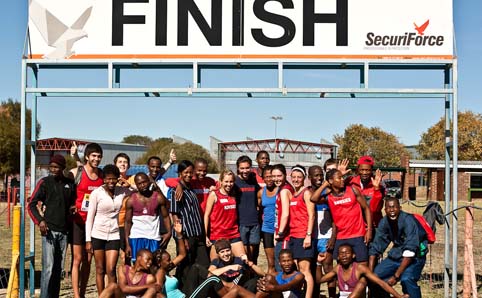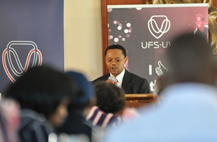Latest News Archive
Please select Category, Year, and then Month to display items
02 January 2025
|
Story Gerda-Marie van Rooyen
|
Photo Supplied
 Leading the research in South Africa is Prof Linus Franke from the Department of Soil, Crop and Climate Sciences.
Leading the research in South Africa is Prof Linus Franke from the Department of Soil, Crop and Climate Sciences.
Scientists are actively pursuing the successful breeding of diploid hybrid potatoes from inbred lines. This is expected to revolutionise potato breeding as it holds the key to rapid genetic progress. It will introduce new varieties for commercialisation through seed. Currently, existing potato variants have a gene that renders self-pollinated seeds infertile.
Prof Linus Franke, an academic in the Department of Soil, Crop and Climate Sciences at the UFS, is leading the research in South Africa. “This technology allows the production of genetically uniform potato seed that is easy to transport and largely disease-free.” He says this differs from conventional breeding whereby only vegetative propagation is possible due to tetraploid varieties in potatoes. It also risks carrying pests and diseases from one generation to the next – leading to the accumulation of pests and diseases with each round of multiplication.
Seed innovation
Prof Franke explains that Solynta BV, a seed company based in the Netherlands that produces potato varieties that can be grown from seed, has included South Africa in their research efforts because it is one of Africa’s largest producers and exporters. Through his academic relationship with Wageningen University and Research, a Dutch institution renowned for its agricultural endeavours and food production, the UFS became involved in researching hybrid potatoes grown from seed.
Diploid seeds containing two sets of chromosomes allow easier gene manipulation to increase predictability and speedier genetic progress. The breeding approach enables the incorporation of tolerance to pests, diseases, abiotic stresses (cold, heat, drought) and other desired genetic traits.
Although Prof Franke is optimistic about this research, he is not blind to disadvantages. “Potato seeds are tiny and have little energy reserves, making it harder to grow potatoes from seed than from tubers.” He says potatoes from seed will take longer to cultivate than tubers, as farmers need to grow plantlets from seeds first, adding six weeks to the growing period. “It is possible that commercial farmers can grow potatoes directly from seed. Alternatively, perhaps more likely, specialised growers will produce tubers of potatoes from seed; these tubers are then sold as seed tubers to other potato farmers, who then continue their normal practices of producing potatoes for the market from tubers.”
Financial benefits
Prof Franke says farmers have reason to get excited. “Seed potatoes will reduce input costs, as varieties with enhanced tolerance to pests and diseases require less pesticides. Planting one hectare of potatoes requires three to four tonnes of potato tubers, but only one 25 g packet of potato seeds.” Since potatoes are a more valuable commodity than maize, this technology might also increase farmers’ income potential.
Intravarsity brings Kovsie Campuses together
2012-05-09
 |
|
Bloemfontein and Qwaqwa Campuses find each other in sport, arts and culture.
|
|
Intravarsity Photo Gallery
|
|
Intravarsity
Two campuses, one university, students coming together for a weekend filled with sport, arts and culture. That was the backdrop to Intravarsity 2012, which was held at the University of the Free State (UFS) on 4 and 5 May 2012.
Students from the Bloemfontein and Qwaqwa Campuses came together on the Main Campus to compete in soccer, netball, cross-country, basketball, debating and chess.
The Qwaqwa Campus raked up victories in soccer with their men’s and women’s teams beating their Bloemfontein counterparts. The women’s team won 3-2, while the men triumphed with 1-0.
Bloemfontein Campus beat Qwaqwa Campus 34-12 in netball, 2-0 in chess and 36-34 in basketball.
However, Intravarsity is not just about sport. Students from the two campuses also engaged in art, cultural and leadership events. These events included a musical festival with top local DJs and a leadership breakfast attended by the student leadership from both campuses.
Talking at the leadership breakfast, Prof. Kwandiwe Kondlo, Head of the Centre for Africa Studies, urged student leaders to strive for selfless leadership. “We want our student leaders to be better leaders than we are. Perhaps at one moment some of you may end up leading this country. I hope when your time comes you will save South Africa from the democratisation of shamelessness and corruption, which has gained the upper hand.”
Mr Rudi Buys, Dean of Student Affairs, told the student leaders that the institution was in crisis five years ago. “Today our campuses are together. I hope the significance of the weekend is not lost.”
Intravarsity 2012 replaced this year’s Intervarsity. The annual Intervarsity between the UFS and North-West University (NWU) has been postponed to 2013.
|
Kovsie student leaders discuss leadership at Intravarsity
 Student leaders from the Bloemfontein and Qwaqwa Campuses attended a leadership breakfast during the Intravarsity weekend of 4 and 5 May 2012. The breakfast, held on the Main Campus, was hosted by the Division: Student Affairs. Student leaders from the Bloemfontein and Qwaqwa Campuses attended a leadership breakfast during the Intravarsity weekend of 4 and 5 May 2012. The breakfast, held on the Main Campus, was hosted by the Division: Student Affairs.
Taking lessons in leadership from Prof. Kwandiwe Kondlo, Head of the Centre for Africa Studies, the Kovsie student leaders discussed the duties and responsibilities of leadership, not only on our campuses but also throughout the country.
Highlighting the role of student leadership Prof. Kondlo told students they needed to be active partners in building a cohesive and united university.
“Student leadership is important in the life of any university; it creates conditions the university requires for the construction and production of knowledge. This is very important; hence cooperation between student leadership and management is so vital.”
Prof. Kwandiwe Kondlo’s speech that he delivered at the leadership breakfast. (pdf format)
|